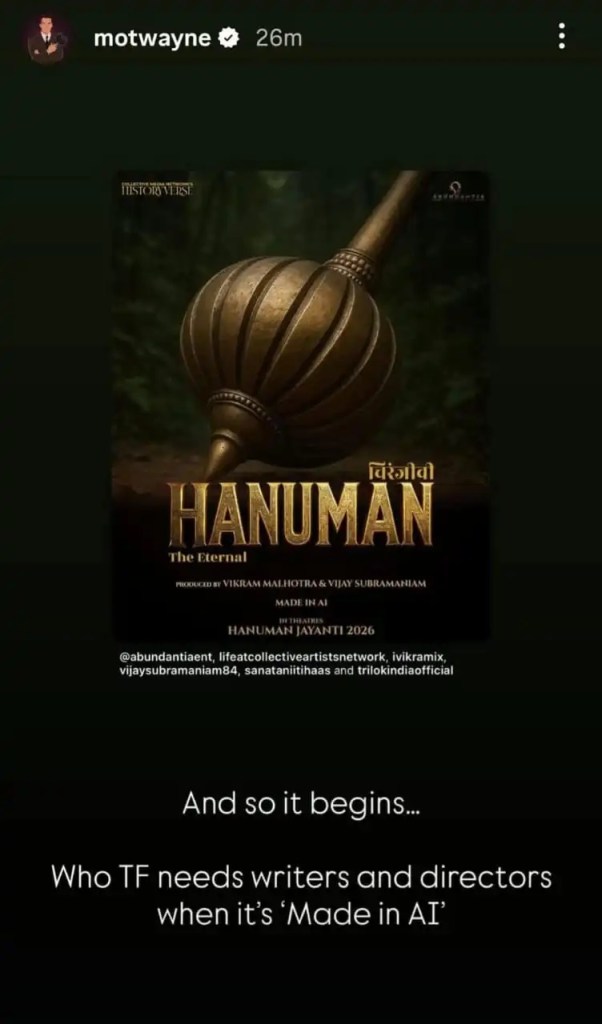India’s entertainment industry is on the cusp of a seismic shift. Abundantia Entertainment and Collective Media Network’s Historyverse division recently unveiled Chiranjeevi Hanuman – The Eternal, an entirely AI‑generated theatrical film drawing from the Ramayana and ancient Puranic texts. Designed to debut on Hanuman Jayanti in 2026, it positions itself as a groundbreaking experiment in blending mythological storytelling with cutting‑edge technology.
The makers describe the film as “Made‑in‑AI” and “Made in India,” promising a visual spectacle intended for a shared theatrical experience. The production has reportedly mobilised over 50 engineers alongside cultural scholars and narrative experts to craft a script that respects tradition while pushing cinematic boundaries.
Adding to the technological innovation, the music will be composed by Trilok, an AI‑powered band noted for fusing spiritual motifs with traditional rhythms.
Vikramaditya Motwane Speaks Out Against AI Film
The announcement ignited immediate backlash from creator‑first circles. Acclaimed filmmaker Vikramaditya Motwane took to his Instagram Story, reposting the film’s initial poster and writing, “And so it begins… Who TF needs writers and directors when it’s ‘Made in AI’.”

Motwane has previously voiced similar concerns in an interview with Hindustan Times. He stated, “I see AI as a threat. The threat is not from the creators using it. The threat is from the people with money wanting to use it to save more money for themselves.” He added, “The threat comes from there. It’s about the people in power using it to be able to say, ‘I can use AI and then I will not hire X number of people for my job’, or ‘I can use AI and I can get rid of X number of people’.”
What AI Means for Filmmaking and Artists
This is more than just a flashy concept announcement, it reflects a fork in the cinematic road. On one hand, Chiranjeevi Hanuman – The Eternal could redefine how mythological epics are visualised, introducing unprecedented efficiency and visual innovation. On the other, it threatens to displace screenwriters, directors, and creative professionals, sparking legitimate fears around job security in the industry.
While creatives are questioning the cost of progress, social media is ablaze. Many express solidarity with Motwane’s stance, worrying that AI could sideline human storytellers entirely. Others are divided, curious about AI’s potential to enhance filmmaking, even as they worry about its consequences.
How Is Hollywood Responding To AI?
While India grapples with its first AI‑driven mythological epic, Hollywood is responding with resistance and regulation rather than celebration.
Director James Cameron, known for his futuristic sci‑fi vision, recently described generative AI in filmmaking as “the most important issue in movies right now,” warning that the developing use of AI in creative work is like the “Wild West.” He urged a responsible approach to ensure technology enhances rather than replaces artistic vision.
Over 420 industry insiders including Natasha Lyonne, Ava DuVernay, and Mark Ruffalo, signed an open letter urging the government to uphold copyright laws amid concerns that companies like OpenAI and Google want to weaken protections for AI training. The awards season has become a flashpoint. After the film The Brutalist revealed use of AI‑generated voice and visuals, guilds like the Sound Editors imposed bans on AI entries, while the Academy is taking a wait‑and‑watch approach via member surveys.
Stay tuned with us for the latest news, Hindi box office news, Hollywood news, OTT news, the latest Bollywood news, and the latest box office news.

